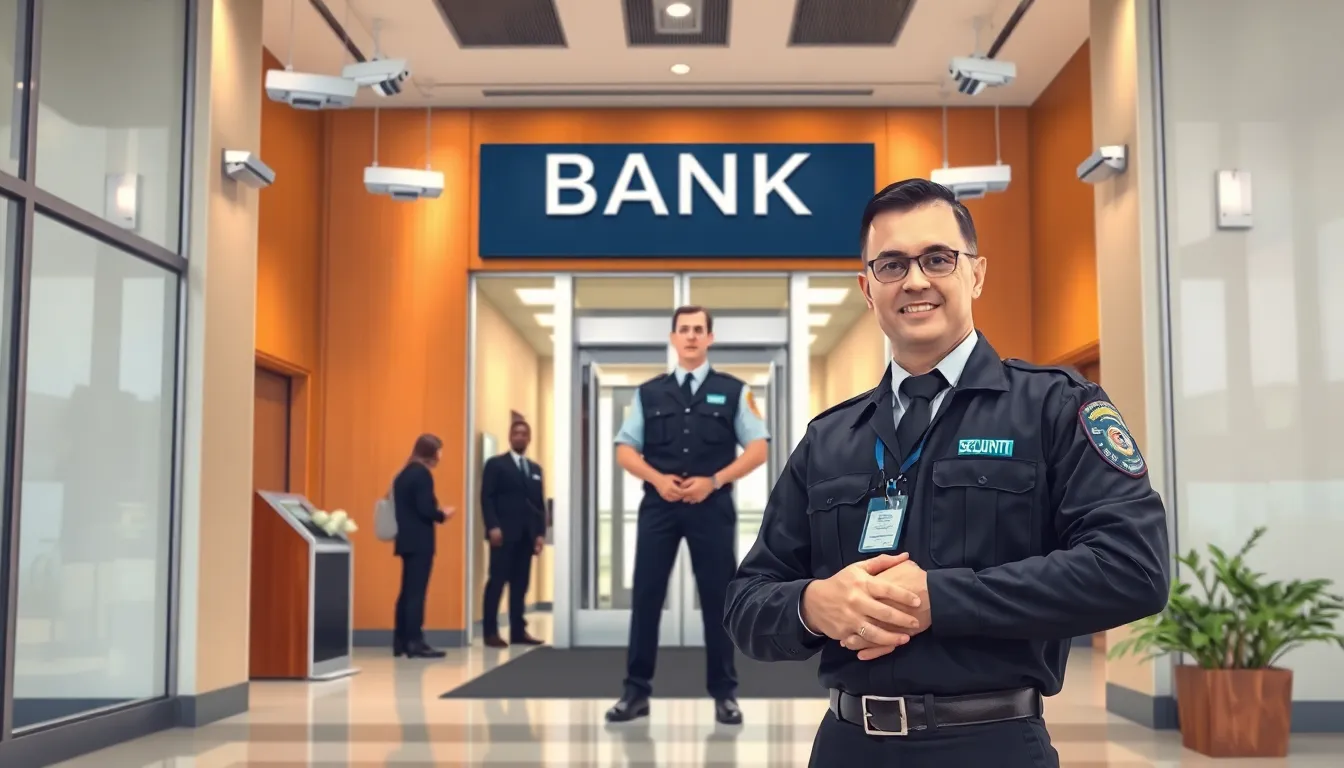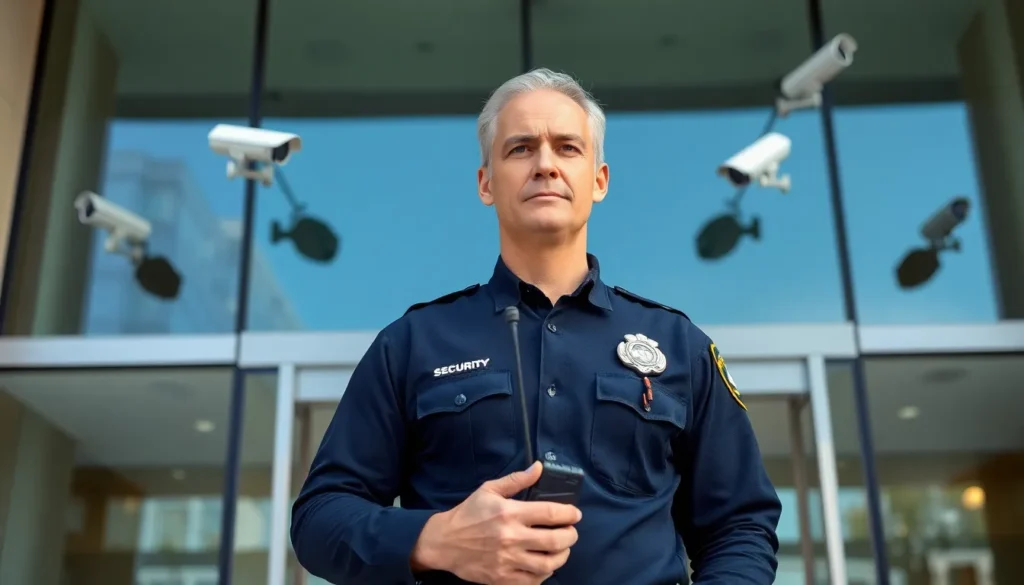Table of Contents
ToggleIn a world where bank heists seem like a Hollywood blockbuster, the heroes are often the unsung security professionals working behind the scenes. Bank security jobs aren’t just about standing guard and looking tough; they’re vital in keeping financial institutions safe from the crafty criminals who think they’ve got it all figured out. With technology evolving faster than a magician pulling rabbits from hats, these roles are more crucial than ever.
Imagine being the guardian of vaults filled with cash, where every day brings a new challenge. Whether it’s monitoring high-tech surveillance systems or devising strategies to outsmart would-be robbers, bank security professionals play a key role in maintaining trust in the banking system. So if you’re ready to trade in the mundane for a career where every day is a new adventure, bank security jobs might just be your calling.
Overview of Bank Security Jobs
Bank security professionals play a critical role in safeguarding financial institutions from criminal activities. These positions combine the use of advanced technologies with strategic planning to enhance safety measures and overall security.
Types of Bank Security Roles
Various roles exist within bank security. Security officers monitor premises, ensuring a visible presence deters potential threats. Surveillance analysts focus on monitoring cameras and reviewing footage for suspicious activities. Risk management specialists assess vulnerabilities and develop plans to mitigate them. Furthermore, cybersecurity experts protect against online threats, safeguarding sensitive data from breaches. Each role contributes uniquely to maintaining the security of financial assets and customer information.
Required Skills and Qualifications
Effective bank security professionals possess a range of skills and qualifications. Strong observational skills allow for the identification of potential threats. Communication skills are crucial for coordinating security strategies and collaborating with law enforcement. A background in criminal justice or a related field often enhances a candidate’s profile. Additionally, expertise in technology, especially in surveillance and cybersecurity, proves invaluable. Attention to detail remains essential for monitoring activities and enforcing security protocols. Training in emergency response adds to a professional’s preparedness for unexpected situations.
Importance of Bank Security

Bank security plays a crucial role in safeguarding financial institutions. Protecting against theft, fraud, and cyber threats falls under the responsibilities of security professionals.
Protecting Financial Assets
Mitigating risks involves various strategies. Security officers monitor premises and deter suspicious activities, while surveillance analysts assess video feeds for anomalies. Risk management specialists develop comprehensive security plans to protect funds. Cybersecurity experts also implement measures to shield digital assets from attacks. Recent statistics show that banks face over 300,000 cyber incidents yearly, emphasizing the need for robust security measures.
Ensuring Customer Safety
Prioritizing the safety of customers remains a top objective. Security professionals engage with patrons, ensuring a secure and welcoming environment. Training in emergency response prepares them to act swiftly during incidents, minimizing chaos. Implementing state-of-the-art surveillance systems enhances overall safety. Studies indicate that institutions with effective security protocols significantly reduce the likelihood of violent crime, fostering trust among clients.
Job Responsibilities in Bank Security
Bank security professionals engage in various critical tasks aimed at ensuring safety. Each responsibility plays a crucial role in protecting financial assets and maintaining customer trust.
Surveillance and Monitoring
Surveillance and monitoring stand as vital aspects of bank security operations. Security officers continually assess live video feeds and monitor alarm systems to detect suspicious behavior. Surveillance analysts scrutinize recorded footage to identify patterns, often assisting in investigations. Advanced technologies, such as motion sensors and biometric systems, enhance surveillance effectiveness. Security teams keep environments safe by regularly inspecting premises and ensuring that protocols are in place. These practices contribute to minimizing theft and fraud, safeguarding hundreds of thousands of dollars monthly.
Emergency Response Protocols
Emergency response protocols establish a clear framework for handling crises. Security professionals train rigorously in emergency procedures, ensuring swift reactions to threats. They collaborate with local law enforcement to coordinate efforts and improve response times. Regular drills and training scenarios prepare personnel for various emergencies, from robberies to natural disasters. Establishing communication strategies enables teams to inform staff and customers promptly during incidents. These proactive measures not only enhance bank safety but also instill confidence among clientele, promoting a secure banking atmosphere.
Career Opportunities and Growth
Bank security jobs offer a range of career opportunities, reflecting the growing importance of safety in financial institutions. Each role contributes significantly to the overall security posture of the bank.
Entry-Level Positions
Entry-level positions often include security officers and surveillance analysts. Security officers monitor premises and must demonstrate strong observational skills. Surveillance analysts evaluate video feeds to identify unusual activity, making attention to detail crucial. Backgrounds in criminal justice or related fields frequently enhance candidates’ prospects. Training programs typically provide guidance in emergency response procedures, allowing individuals to gain essential skills from the outset. Opportunities for advancement begin early, as entry-level professionals often receive mentorship from senior staff.
Advanced Career Paths
Advanced career paths in bank security include roles such as risk management specialists and cybersecurity experts. Risk management specialists strategize to develop comprehensive security plans that protect customers and assets. Cybersecurity experts focus on safeguarding digital information against threats, addressing the alarming statistic of over 300,000 cyber incidents faced by banks annually. These positions require extensive technical expertise and knowledge of current security technologies. Professionals in these roles often participate in ongoing education to keep pace with evolving threats, playing a vital role in shaping the future of bank security. Success in these careers frequently leads to higher responsibilities, including team leadership and strategic decision-making.
Bank security jobs offer a vital service in an ever-evolving landscape of threats. As financial institutions face increasing risks from both physical and cyber realms, the demand for skilled professionals continues to grow. These roles not only provide a sense of adventure but also contribute significantly to the safety and trust of customers.
With various career paths available, individuals can find opportunities that align with their skills and interests. Whether monitoring surveillance feeds or developing cybersecurity strategies, each position plays a crucial part in safeguarding financial assets. As the industry adapts to new challenges, those pursuing a career in bank security can expect a rewarding and dynamic professional journey.




